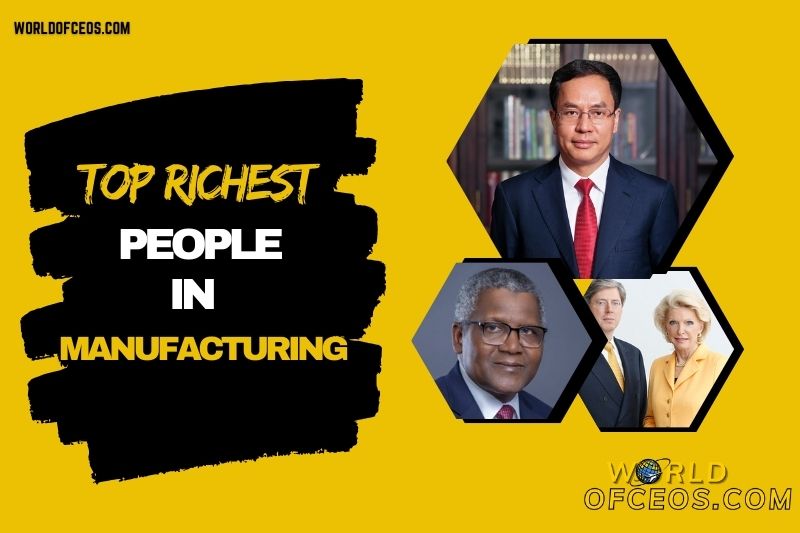Hi, I’m from worldofceos, and welcome to our comprehensive analysis of the richest people in the manufacturing industry. Today, we’ll explore the astonishing net worth of these industry leaders and the sources of their immense wealth.
Richest People in Manufacturing Industry
Reinhold Wuerth
Reinhold Wuerth leads the Wuerth Group, a global leader in assembly and fastening materials supply. With a net worth of $36.6 billion, Wuerth transformed his father’s small wholesale screw business into a multinational enterprise, showcasing his business acumen and leadership skills.
Li Hejun
Li Hejun chairs Hanergy Holdings, a company focusing on renewable energy and thin-film solar technology. With a net worth of $29.4 billion, Li has transformed the industry through innovative approaches to wind and hydropower generation. His book, “China’s New Energy Revolution,” highlights his vision for sustainable energy.
Georg Schaeffler and Maria-Elisabeth Schaeffler
Georg Schaeffler, worth $26.5 billion, and his mother Maria-Elisabeth Schaeffler, with $6.6 billion, co-own the Schaeffler Group. This company is a leading manufacturer of ball bearings and machine components, pivotal in various industrial applications. Their leadership has kept the company at the forefront of manufacturing innovation.
Aliko Dangote
Aliko Dangote is Africa’s richest man with a net worth of $15.7 billion. He owns the Dangote Group, which operates in food and cement manufacturing. Despite fluctuations in demand and currency challenges, Dangote’s strategic management has sustained the company’s significant market presence.

Murat Ulker and Ahsen Ozokur
Murat Ulker, worth $4.3 billion, chairs Yildiz Holding, Turkey’s largest food company, while his sister Ahsen Ozokur, worth $1.7 billion, acts as a major shareholder. The company’s acquisition of Godiva Chocolatier highlights their strategic expansion into the global luxury food market.
Mitchell Rales and Steven Rales
Brothers Mitchell Rales, with $4 billion, and Steven Rales, with $3.7 billion, own numerous companies, including Danaher Corporation, a major global manufacturer. Their early acquisition strategies have positioned Danaher as a leader in diverse industrial sectors.
Diane Hendricks
Diane Hendricks owns and chairs ABC Supply and presides over Hendricks Holding Co. With a net worth of $3.6 billion, Hendricks has built the nation’s largest roofing, window, and siding wholesale distributor, expanding her influence in manufacturing and logistics.
To learn more about the top earners in various fields, read our articles on the Richest People in the Healthcare Industry and the Richest People in the Fashion and Retail Industry.
FAQs about the Richest People in the Manufacturing Industry

What Defines the Richest People in the Manufacturing Industry?
The wealthiest individuals in the manufacturing industry are those who have amassed significant fortunes through ownership, investments, and leadership in manufacturing companies. Their net worth is often driven by their ability to innovate, expand their businesses globally, and effectively manage operations and finances.
Who is the Wealthiest Person in the Manufacturing Industry?
As of 2024, Reinhold Wuerth is the richest individual in the manufacturing sector, with a net worth of approximately $36.6 billion. Wuerth has built his fortune through the Wuerth Group, which specializes in assembly and fastening materials.
How Do These Billionaires Increase Their Wealth?
The richest people in the manufacturing industry increase their wealth through various means, including expanding their product lines, entering new markets, innovating manufacturing processes, and strategic acquisitions. They also invest in other sectors such as real estate, technology, and finance, diversifying their income sources.
Are There Any Female Billionaires in the Manufacturing Industry?
Yes, there are notable female billionaires in the manufacturing industry. For instance, Gina Rinehart, primarily known for her wealth in mining, has substantial investments in the manufacturing sector. Her diverse portfolio and leadership have made her one of the wealthiest women globally.
How Do Economic Trends Affect the Net Worth of These Billionaires?
Economic trends, including global demand, trade policies, and technological advancements, significantly impact the net worth of manufacturing billionaires. A surge in demand for specific products or favorable trade agreements can boost profits, while economic downturns or trade restrictions can negatively affect their wealth.
What Challenges Do Manufacturing Billionaires Face?
Manufacturing billionaires face several challenges, including maintaining operational efficiency, managing supply chain disruptions, adhering to environmental regulations, and staying ahead of technological advancements. These challenges require strategic planning and adaptability to maintain and grow their wealth.
How Do They Contribute to Economic Growth?
These billionaires contribute to economic growth by creating jobs, investing in infrastructure, and driving innovation. Their companies often set industry standards and boost local economies by establishing manufacturing plants and distribution centers, thereby fostering economic development.
What Philanthropic Activities Are They Involved In?
Many manufacturing billionaires are also noted for their philanthropic efforts. They often establish foundations, support educational initiatives, and fund healthcare projects. For example, He Xiangjian has made significant donations to educational institutions and social welfare programs, reflecting their commitment to giving back to society.
Conclusion
Understanding the richest people in the manufacturing industry provides insight into the global economy and the sources of immense wealth. For more in-depth analyses, visit worldofceos.com.

